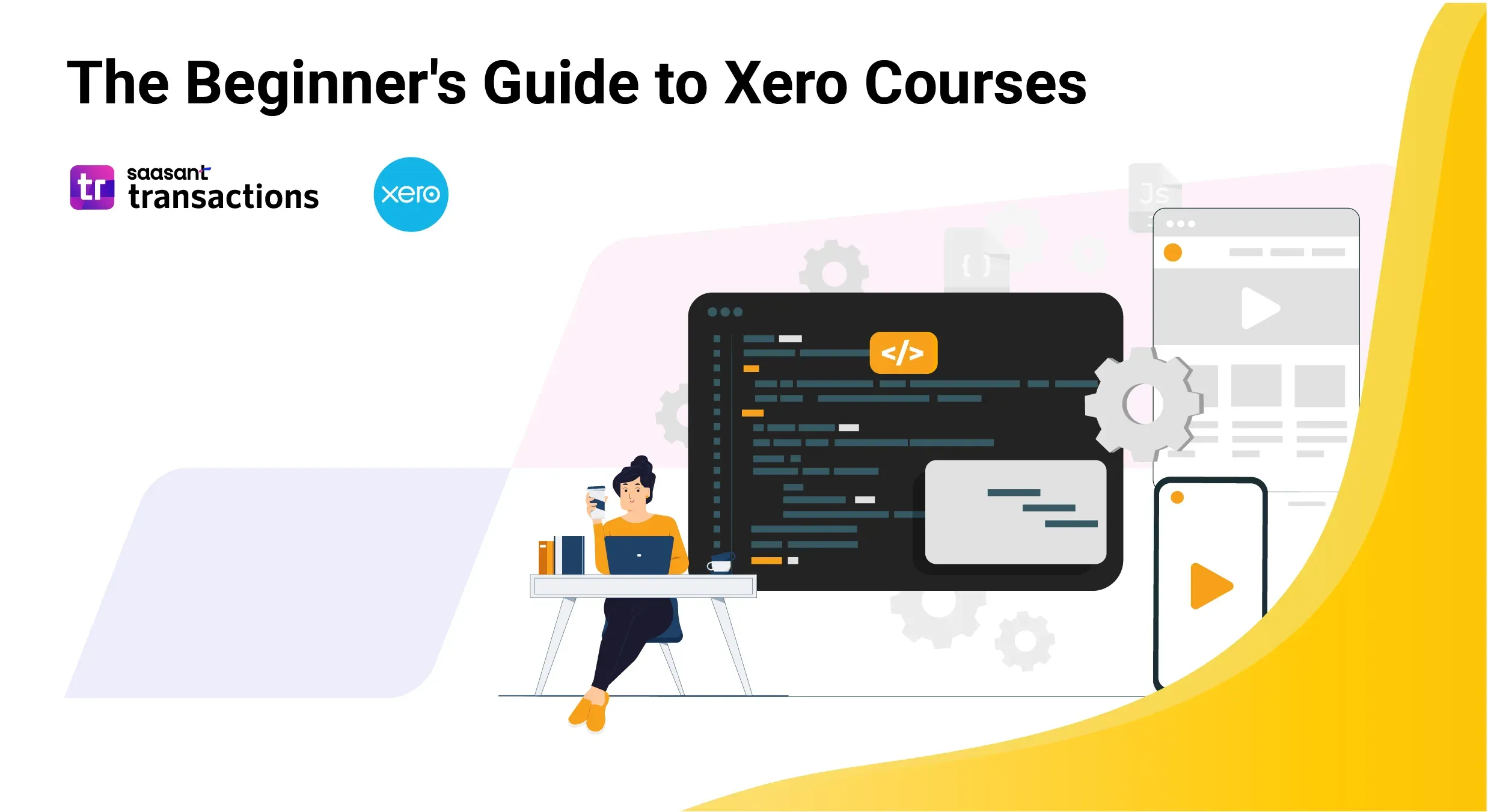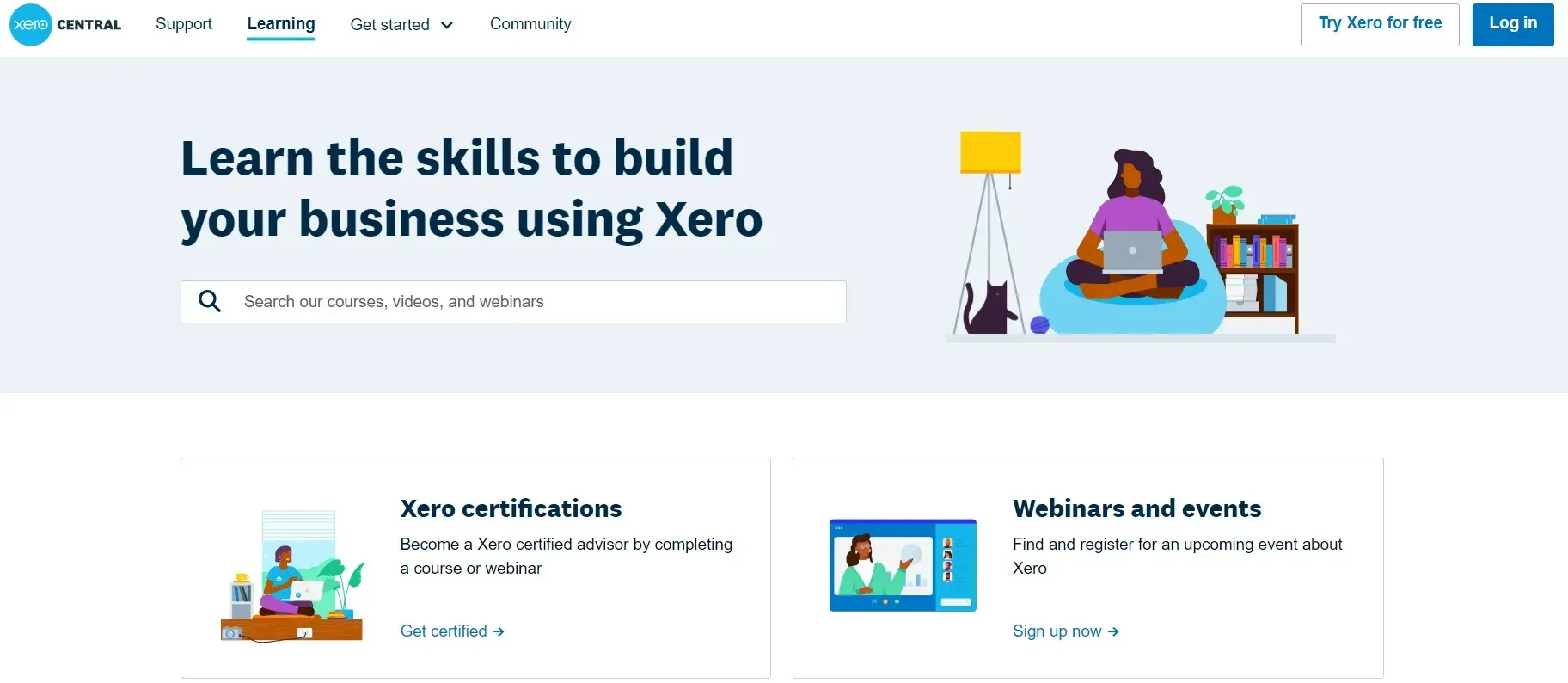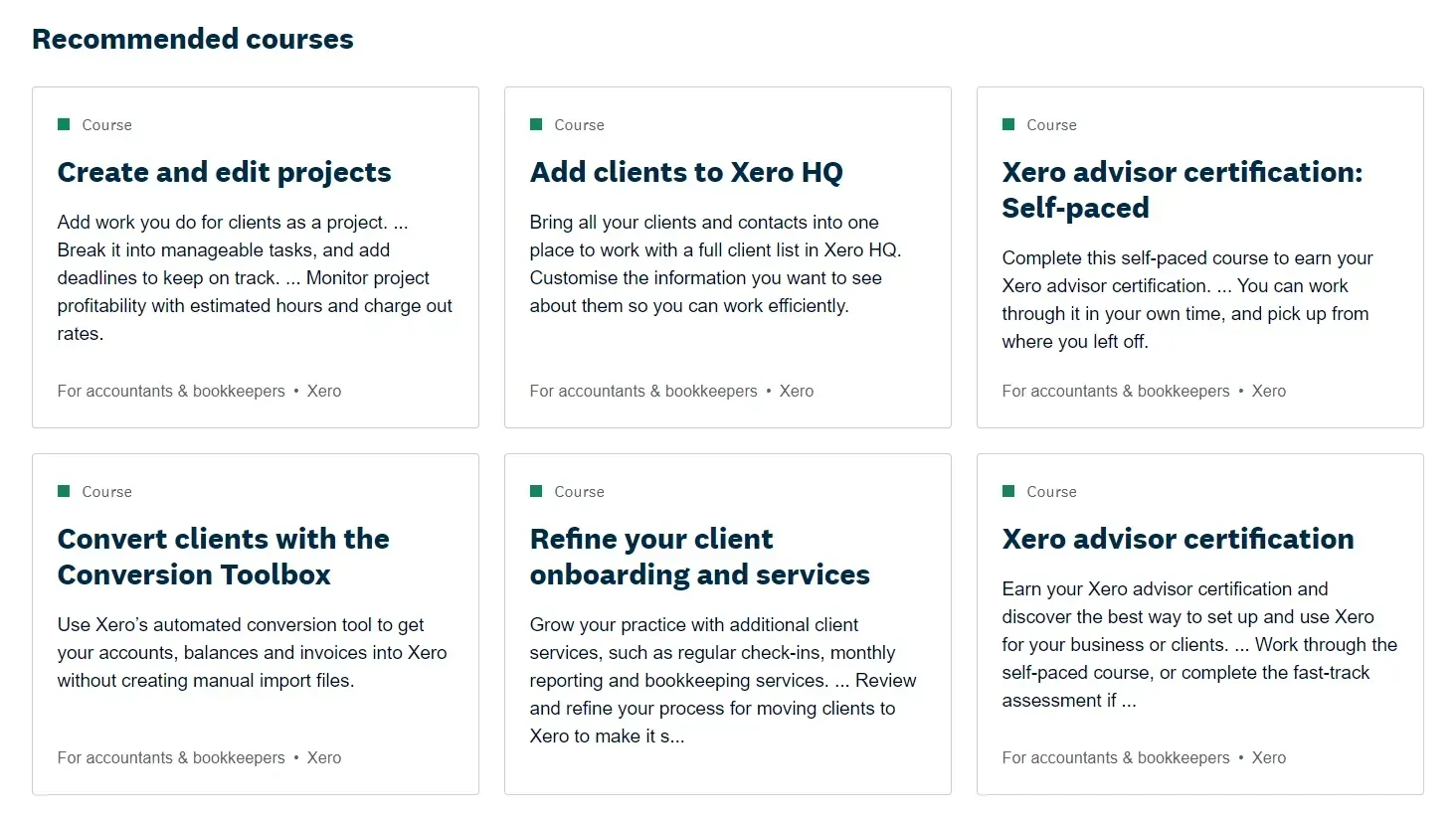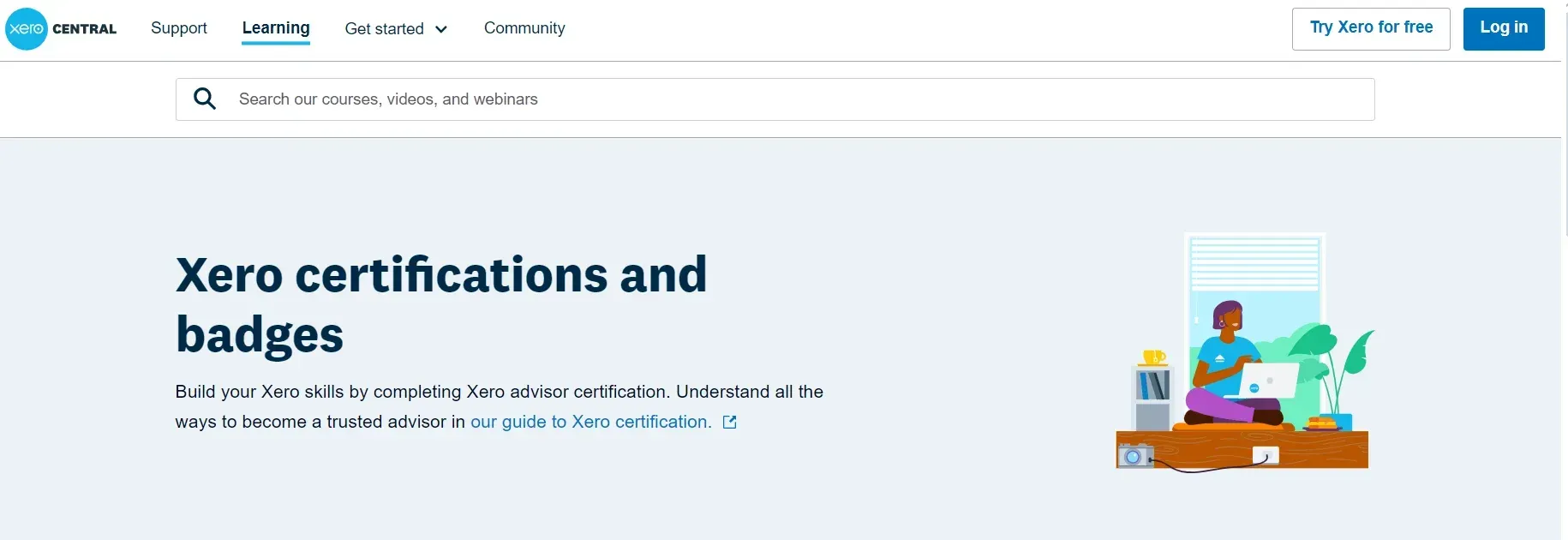The Beginner's Guide to Xero Courses: Find the Right Training for You
 Xero has cemented its place as a leading cloud accounting software globally, favoured for its user-friendly design and powerful features. It effectively streamlines essential business tasks like invoicing, expense management, bank reconciliation, payroll, and financial reporting. But if you're just starting with Xero, navigating its full capabilities can seem daunting.
Xero has cemented its place as a leading cloud accounting software globally, favoured for its user-friendly design and powerful features. It effectively streamlines essential business tasks like invoicing, expense management, bank reconciliation, payroll, and financial reporting. But if you're just starting with Xero, navigating its full capabilities can seem daunting.
That's where targeted training comes in! This guide will walk you through why investing time in a Xero course is beneficial, explore the different types of training available (free and paid), and help you choose the best path for your specific needs and learning style. Whether you're a small business owner managing your own books, an aspiring bookkeeper, or a seasoned accountant adding Xero to your skillset, the right training will accelerate your journey to mastering this invaluable software.
Contents
Why Take a Xero Accounting Course?
Your Learning Style Matters: Choosing the Right Xero Course Format
Free Xero Course Options: A Great Place to Start
Paid Xero Courses: Where to Look & What to Expect
Should I Get a Xero Certification? Weighing the Benefits
Recommended Xero Courses: Take Your Skills to the Next Level
Why Take a Xero Accounting Course?
While Xero is designed to be intuitive, truly mastering its efficiency and advanced features takes more than just casual exploration. Structured Xero training offers significant advantages:
Slash Your Learning Curve: Courses provide structured guidance on proven workflows and best practices for tasks like invoicing, bank reconciliation, payroll setup, and reporting. This avoids frustrating trial-and-error and gets you productive faster.
Unlock Xero's Full Potential: Beyond the basics, Xero offers advanced features for managing taxes (like GST/VAT), inventory, projects, multi-currency transactions, and in-depth financial analysis. Courses often uncover these powerful tools, ensuring you get maximum value.
Boost Your Professional Value: Proficiency in leading cloud accounting software like Xero is highly sought after by employers and clients. Adding Xero skills and potentially certification to your resume demonstrates commitment and gives you a competitive edge in the accounting and bookkeeping job market. Recent industry insights continue to highlight technological proficiency (including specific software like Xero) as a key skill for accountants in 2025 and beyond.
Key Takeaway: A Xero course is more than software training; it's an investment in your efficiency, financial management capabilities, and potential career advancement.
Your Learning Style Matters: Choosing the Right Xero Course Format
Xero training comes in various formats. Finding one that suits your preferences, schedule, and budget is key to a successful learning experience:
Online vs. In-Person:
Online: Offers maximum flexibility – learn anytime, anywhere. Typically includes video lessons, downloadable resources, quizzes, and sometimes online communities. Ideal for self-starters and those with busy schedules.
In-Person: Provides a traditional classroom setting with direct instructor interaction, real-time Q&A, and potential networking. Better for those who prefer structured, hands-on guidance.
Self-Paced vs. Live Classes:
Self-Paced: Progress through materials at your own speed. Perfect if you need to revisit topics, focus on specific areas, or fit learning into short blocks of time. Requires self-discipline.
Live Classes: Follow a set schedule (online webinars or in-person). Provides structure, accountability, and immediate interaction with instructors and peers.
Choosing the Right Format: Consider if you learn best independently or with guidance, visually or hands-on. Factor in your schedule flexibility and location.
Note: Some providers offer hybrid models, blending online self-paced learning with scheduled live Q&A sessions or workshops.
Free Xero Course Options: A Great Place to Start
While paid Xero courses generally offer the most comprehensive content, a surprising amount of excellent free material is available to get your feet wet. Here's where to find these resources and what you can expect:
Where to Find Free Xero Courses

Xero Central Learning: Xero's official learning hub (https://learning.central.xero.com/) is the best starting point. It offers numerous free, self-paced courses, videos, and webinars covering fundamentals like setup, invoicing, bank feeds, reporting, and specific features. They have learning paths for both small businesses and accounting partners.
Official Xero YouTube Channel: Provides tutorials, feature explanations, and tips directly from Xero.
Online Course Platforms (Trial/Free Courses): Platforms like Udemy, Coursera, and LinkedIn Learning sometimes offer free introductory Xero courses or limited-time free access.
Bookkeeping/Accounting Blogs: Reputable accounting professionals and Xero Partners often share free tips, articles, and guides on their websites.
What Free Resources Offer:
Excellent introduction to Xero's core functions and interface.
A risk-free way to evaluate Xero if you're considering switching.
Often bite-sized, making it easy to learn in short bursts.
Limitations:
Usually lack depth on advanced topics (complex payroll, industry specifics, deep API integrations).
May lack a cohesive, structured learning path compared to paid courses.
Quality can vary; prioritize official Xero resources or well-reviewed content from certified professionals.
Key Takeaway: Free resources, especially Xero Central, are invaluable starting points. Use them to grasp the basics and decide if you need more in-depth, structured training.
Paid Xero Courses: Where to Look & What to Expect
When you need comprehensive knowledge, structured learning, or preparation for certification, paid courses are the next step.
Where to Find Quality Paid Courses:
Online Course Platforms: Marketplaces like Udemy, Coursera, and LinkedIn Learning host a vast range of Xero courses.
Tip: Look for courses with high student ratings, recent updates (Xero changes!), clear curriculum outlines, and instructors with verifiable credentials (e.g., CPA, Chartered Accountant, Xero Certified Advisor).
Official Xero Education Partners: Many accounting firms or training providers who are official Xero Partners offer specialized Xero training, often tailored to specific industries or regions. You might find these via local search or sometimes through the Xero Partner Directory.
Dedicated Training Providers: Companies specializing in accounting software or professional development often offer structured Xero courses online or sometimes in person (e.g., The Career Academy, Cloud Accounting IO, MyTectra are examples found in different regions).
Typical Costs & Time Commitment:
Cost: Varies greatly. Short courses on platforms like Udemy might range from $20 - $200 USD/AUD/GBP (often discounted). More comprehensive programs from dedicated providers or leading to certifications can range from $300 - $1000+. Always check current pricing.
Time: Short courses might take a few hours total. Comprehensive programs can require 20-50+ hours of learning and practice.
How to Evaluate Paid Courses:
Instructor Expertise: Are they a certified Xero Advisor, accountant, or experienced bookkeeper?
Student Reviews: Look for recent, detailed feedback.
Curriculum: Does it cover the specific topics you need to learn?
Last Updated Date: Crucial for software training – ensure it reflects recent Xero versions.
Learning Support: Does it include Q&A forums, instructor access, or practical exercises?
Cost vs. Value: Does the content depth justify the price?
Short Courses vs. In-Depth Training: Understanding Your Xero Needs
Choosing the right Xero learning path depends on how extensively you plan to use the software and the level of mastery you need. Here's a breakdown of when short courses or in-depth training might be the most suitable choice:
Short Xero Courses: Targeted Skill Development

Short Xero Courses (Targeted Skills):
Best For: Business owners needing specific functions (e.g., mastering invoicing, setting up bank feeds), or existing users needing to learn a new feature (e.g., Xero Projects, inventory).
Benefits: Focused, affordable, quicker results for specific tasks.
In-Depth Xero Training (Comprehensive Expertise):
Best For: Aspiring or current bookkeepers/accountants needing job-ready skills, business owners managing complex finances (payroll, multi-currency, advanced reporting), or those preparing for Xero certification.
Benefits: Builds a strong foundation, covers broad functionality, prepares for professional roles.
Key Takeaway: You can start small! Master the basics with free resources or a short course, then invest in in-depth training as your needs or career goals evolve.
Should I Get a Xero Certification? Weighing the Benefits

Xero certifications formally recognise your proficiency, primarily aimed at accounting and bookkeeping partners.
Main Xero Certifications (via Xero Central):
Xero Advisor Certification: The foundational certification demonstrating core Xero competency. Covers setup, daily tasks, reporting, and Xero HQ for partners.
Xero Payroll Certification: Region-specific (e.g., Australia, UK, NZ), focusing on setting up and processing payroll accurately within Xero according to local regulations.
Xero Migration Certification: For professionals assisting clients in moving data to Xero.
(Specialist Badges may also be available for areas like Inventory)
Benefits of Certification:
Validate Expertise: Officially proves your skills to employers and clients.
Increase Credibility & Trust: Especially valuable for freelance bookkeepers, accountants, and consultants.
Potential for Higher Rates/Opportunities: Certified professionals may command higher fees or access specialised roles.
Partner Program Requirement: Often a key part of becoming and maintaining status as a Xero Partner.
How to Get Certified:
Learning and assessment happen through Xero Central Learning.
Options include self-paced online courses, live webinars, or a 'fast-track' assessment for experienced users.
Cost: Official Xero certifications obtained directly through Xero Central for partners are typically FREE. (Note: External providers may charge for preparation courses that help you study for certification).
Maintenance: Certification requires ongoing learning – typically passing quarterly knowledge checks on Xero product updates to keep your status active (usually by Dec 12th each year).
Who Benefits Most?
Accountants, Bookkeepers, and Financial Advisors using Xero professionally with clients.
Individuals aiming to become official Xero Partners.
(Optional but potentially useful for hands-on Business Owners managing complex setups).
Key Takeaway: Certification is a valuable investment for professionals building a career around Xero expertise. Assess if the benefits align with your client-facing or employment goals.
Recommended Xero Courses: Take Your Skills to the Next Level
Choosing a Xero course is a personal decision, but if you're overwhelmed by the choices, consider these highly-rated options curated based on different needs and preferences:
Best for Beginners
Best for Self-Paced Learning
Beyond Courses: Explore These Valuable Xero Resources
While Xero courses provide structured learning, a wealth of additional resources support your journey. Here are a few excellent places to find answers, get inspiration, and connect with other Xero users:
Xero Blog: Xero's official blog offers tips, news updates, and insights on using Xero effectively for your business.
Xero Central: This extensive knowledge base includes online courses, tutorials, and detailed help articles to answer common questions.
Accounting and Bookkeeping Forums: Online communities dedicated to accounting and bookkeeping often have dedicated Xero threads where users share advice and troubleshoot issues.
Xero App Marketplace: Explore the wide range of apps that integrate with Xero to extend its functionality for specific industries or tasks.
Key Takeaway: Learning Xero continues even after your course ends. Take advantage of these free resources for ongoing support and to discover new ways to streamline your accounting processes with Xero.
Read also
Getting Started with Xero: Essential Steps & Settings
Mastering Xero: Your Beginner's Guide to Cloud Accounting
Xero Accounting Mastery: Essential Xero Courses
Xero Pricing Australia: Your Complete Breakdown